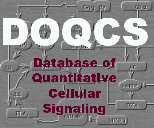
|
Enter a Search String | | Special character and space not allowed in the query term.
Search string should be at least 2 characters long. |
Molecule Parameter List for LuxR-AI | The statistics table lists the distribution of a molecule acting either as a substrate, product, enzyme or as a molecule within the network.
The text color of a molecule is highlighted by  color. color. | | Statistics |
Accession and Pathway Details | |
| Accession Name | Accession No. | Accession Type | Pathway Link | Quorum_
repressilator | 69 | Network |
Shared_Object_Quorum_repressilator, TetR, LacI,
Lambda-cl, LacI_2nd_copy, LuxI | This model represents a single cell with the repressilator circuit, which is part of a population of similar cells. The repressilator circuit is a network of three proteins, i.e. LacI, TetR, Lambda-cI.
The single repressilator model is at accession number 68 in the DOQCS database.
In the current model, the LacI is coupled with LuxI which forms an Autoinducer(AI) protein, which couples to LuxR which activates LacI. The AI protein difffuses across the cell membrane so that the population of cells can interact. The lifetime ratio is the ratio between the mRNA and protein lifetimes. This ratio in different cells is chosen from a random gaussian distribution of mean 1 and standard deviation 0.05. The lifetime ratio of this example cell is 0.9837 |
LuxR-AI acting as a Molecule in Quorum_repressilator Network
| Name | Accession Name | Pathway Name | Initial Conc.
(uM) | Volume
(fL) | Buffered | | LuxR-AI | Quorum_
repressilator
Accession No. : 69 | LuxI
Pathway No. : 303 | 0 | 3 | No | | Lux R complexed with AI |
LuxR-AI acting as a Substrate in a reaction in Quorum_repressilator Network
| Kd is calculated only for second order reactions, like nA+nB <->nC or nA<->nC+nD, where n is number and A,B,C,D are molecules, where as for first order reactions Keq is calculated.
Kd for higher order reaction are not consider. |
| | Name | Accession Name | Pathway Name | Kf | Kb | Kd | tau | Reagents | | 1 | LuxR-AI_
complex_
dimerization | Quorum_
repressilator
Accession No. : 69 | LuxI
Pathway No. : 303 | 1.8
(uM^-1 s^-1) | 0.1
(s^-1) | Keq = 0.0556(uM) | - | Substrate
LuxR-AI
LuxR-AI
Product
2_LuxR-AI
| | | Dimerization of the complex between Lux R and the autoinducer protein Kf = 1.8e+18 /sec/M = 1.8 /sec/uM McMillen, M. et al. (2002) PNAS USA 99(2):679-684 | | 2 | LuxR-AI_
degradation | Quorum_
repressilator
Accession No. : 69 | LuxI
Pathway No. : 303 | 0.2
(s^-1) | 0
(s^-1) | - | - | Substrate
LuxR-AI
Product
Degraded_
LuxR-AI
| | | Degradation of autoinducer complexed to LuxR, kf = 0.2, McMillen et al (2002) PNAS 99(2) 679 - 84 |
LuxR-AI acting as a Product in a reaction in Quorum_repressilator Network
| Kd is calculated only for second order reactions, like nA+nB <->nC or nA<->nC+nD, where n is number and A,B,C,D are molecules, where as for first order reactions Keq is calculated.
Kd for higher order reaction are not consider. |
| Name | Accession Name | Pathway Name | Kf | Kb | Kd | tau | Reagents | LuxR_binding_
autoinducer | Quorum_
repressilator
Accession No. : 69 | LuxI
Pathway No. : 303 | 5
(uM^-1 s^-1) | 0.1
(s^-1) | Kd(bf) = 0.02(uM) | - | Substrate
AI-1
LuxR
Product
LuxR-AI
| | Binding of Lux R to the autoinducer protein Kf = 5e+06 /M = 5 /uM McMillen, M. et al. (2002) PNAS USA 99(2): 679-84 |
| Database compilation and code copyright (C) 2022, Upinder S. Bhalla and NCBS/TIFR
This Copyright is applied to ensure that the contents of this database remain freely available. Please see FAQ for details. |
|
